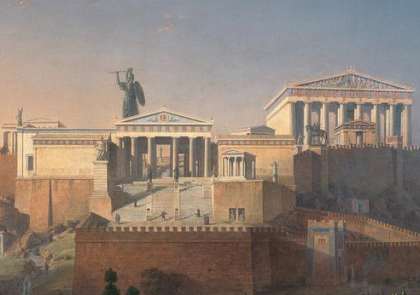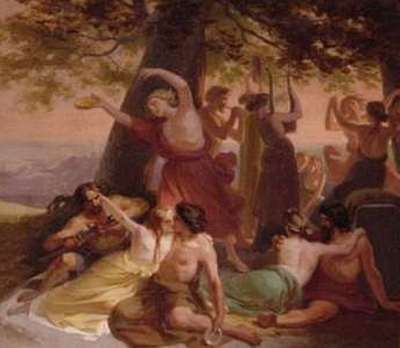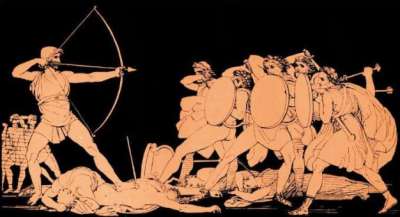
In these last weeks a sudden and unexpected wave of optimism, proud patriotism and faith in the power of democracy has moved on and been spreading almost all over the world. The glowing hopes and the great expectations for the time to come seem to have overcome even the most deep rooted scepticism.
Indeed attachment and loyalty to the community had an extraordinary significance especially in the ancient world, it was a sacrosanct duty and certainly had a remarkable influence on citizens and politicians alike. Patriotism was also the most effective means of cohesion, perhaps the true basic proviso able to achieve – or at least to grant the preconditions of – social stability and widespread respect for the laws and institutions.
In truth there are quite several examples in ancient Greek literature of expressions of the pride to belong to a community and praising its foundations and traditions. Very likely the most famous eulogy to one’s country and frank praise of democracy is Pericles’ speech to commemorate the Athenian soldiers who perished in the first year of the Peloponnesian War (431-430 b.C.). This episode is masterly narrated by Thucydides and, albeit according to his writing style it cannot be considered utterly authentic: meaning not a true and fair journalistic report of the facts, it certainly is a honest artistically well structured and written memoir of this outstanding actual event. During this tribute the supreme στρατεγος took the opportunity not simply to condole the parents, wives and children of the war victims, but also to celebrate the institutions of his πολις, its social and political achievements and its remarkably highly advanced customs and lifestyle: a model for the other Greek πολεις – and, as we have then well learnt, altogether a most refined and enlightened civilisation leadership under whose influence we still live today:
“I shall begin with our ancestors: it is both just and proper that they should have the honour of the first mention on an occasion like the present. They dwelt in the country without break in the succession from generation to generation, and handed it down free to the present time by their valour… but what was the road by which we reached our position, what the form of government under which our greatness grew, what the national habits out of which it sprang; these are questions which I may try to solve before I proceed to my panegyric upon these men…
Our constitution does not copy the laws of neighbouring states; we are rather a pattern to others than imitators ourselves. Its administration favours the many instead of the few; this is why it is called a democracy. If we look to the laws, they afford equal justice to all in their private differences; if no social standing, advancement in public life falls to reputation for capacity, class considerations not being allowed to interfere with merit; nor again does poverty bar the way, if a man is able to serve the state, he is not hindered by the obscurity of his condition. The freedom which we enjoy in our government extends also to our ordinary life… But all this ease in our private relations does not make us lawless as citizens. Against this fear is our chief safeguard, teaching us to obey the magistrates and the laws, particularly such as regard the protection of the injured, whether they are actually on the statute book, or belong to that code which, although unwritten, yet cannot be broken without acknowledged disgrace.
Further, we provide plenty of means for the mind to refresh itself from business. We celebrate games and sacrifices all the year round, and the elegance of our private establishments forms a daily source of pleasure and helps to banish the spleen; while the magnitude of our city draws the produce of the world into our harbour, so that to the Athenian the fruits of other countries are as familiar a luxury as those of his own.
… We throw open our city to the world, and never by alien acts exclude foreigners from any opportunity of learning or observing, although the eyes of an enemy may occasionally profit by our liberality; trusting less in system and policy than to the native spirit of our citizens; while in education, where our rivals from their very cradles by a painful discipline seek after manliness, at Athens we live exactly as we please, and yet are just as ready to encounter every legitimate danger… And yet if with habits not of labour but of ease, and courage not of art but of nature, we are still willing to encounter danger, we have the double advantage of escaping the experience of hardships in anticipation and of facing them in the hour of need as fearlessly as those who are never free from them.
Nor are these the only points in which our city is worthy of admiration. We cultivate refinement without extravagance and knowledge without effeminacy; wealth we employ more for use than for show, and place the real disgrace of poverty not in owning to the fact but in declining the struggle against it. Our public men have, besides politics, their private affairs to attend to, and our ordinary citizens, though occupied with the pursuits of industry, are still fair judges of public matters; for, unlike any other nation, regarding him who takes no part in these duties not as unambitious but as useless, we Athenians are able to judge at all events if we cannot originate, and, instead of looking on discussion as a stumbling-block in the way of action, we think it an indispensable preliminary to any wise action at all. Again, in our enterprises we present the singular spectacle of daring and deliberation, each carried to its highest point, and both united in the same persons; although usually decision is the fruit of ignorance, hesitation of reflection. But the palm of courage will surely be adjudged most justly to those, who best know the difference between hardship and pleasure and yet are never tempted to shrink from danger…
In short, I say that as a city we are the school of Hellas, while I doubt if the world can produce a man who, where he has only himself to depend upon, is equal to so many emergencies, and graced by so happy a versatility, as the Athenian. And that this is no mere boast thrown out for the occasion, but plain matter of fact, the power of the state acquired by these habits proves. For Athens alone of her contemporaries is found when tested to be greater than her reputation, and alone gives no occasion to her assailants to blush at the antagonist by whom they have been worsted, or to her subjects to question her title by merit to rule. Rather, the admiration of the present and succeeding ages will be ours, since we have not left our power without witness, but have shown it by mighty proofs; and far from needing a Homer for our panegyrist, or other of his craft whose verses might charm for the moment only for the impression which they gave to melt at the touch of fact, we have forced every sea and land to be the highway of our daring, and everywhere, whether for evil or for good, have left imperishable monuments behind us. Such is the Athens for which these men, in the assertion of their resolve not to lose her, nobly fought and died; and well may every one of their survivors be ready to suffer in her cause.
Not so rarely, even the Greek tragedies of the V century b.C. report plain hints of acclamation towards the achievements of Athens and the nationalistic courage of its citizens and soldiers. In the Persians, written by Aeschylus in 472 b.C., the plot’s background is the naval victory the Greeks (lead by the Athenians) on the Persians in the waters of Salamina in 480 b.C.; Aeschylus places the tragic leverage on showing the events under the perspective of the defeated army and court: Xerses, his mother Queen Atossa and thus the whole dialogues among the Persians aim at amply show the enormous differences between the two contenders:
ATOSSA – You, its first interpreter, have indeed read the meaning of my dream with goodwill, at least, toward my son and house. May the outcome then prove beneficial! When I return to the palace, I will perform for the gods and my dear ones beneath the earth all those rites which you recommend. Meanwhile, my friends, I would like to learn where Athens is located.
CHORUS – Far from here, to the west where the last rays of our Lord the Sun set.
ATOSSA – Can it then really be that my son had the keen desire to make this city his prey?
CHORUS – Yes, for then all Hellas would be subject to the King.
ATOSSA – Does their army have such a multitude of men?
CHORUS – Yes, it is an army of such magnitude that it has caused great disaster for the Medes.
ATOSSA – And what else have they besides? Do they have sufficient wealth in their homes?
CHORUS – Of silver they possess a veritable fountain, a treasure chest in their soil.
ATOSSA – Is the bow-stretching arrow particularly suited to their hands?
CHORUS – Far from it; they have lances for close fight and shields that serve them for armour.
ATOSSA – And who is set over them as shepherd and is master of their host?
CHORUS – Of no man are they called the slaves or vassals.
ATOSSA – How then can they withstand the attack of an invading foe?
CHORUS – So well as to have destroyed Darius’ great and courageous host.
ATOSSA – In truth, your words have given the fathers and mothers of those who are now on their way there dire food for thought.
CHORUS – No, rather I think that you will soon learn the truth of the matter. For here comes one who is beyond a doubt a Persian courier. He bears clear tidings of some issue, be it good or bad.
A more accurate praise of Athens democratic foundations and their social and political success in governing the golden πολις, is plainly stated by Euripides in his Suppliants (424 b.C.), where the author compares the institutions of Thebe with the constitution of Athens. Within the plot Theseus, king of Athens, confronts the messenger of Creon (the king of Thebe) explaining to him what were – and still are – most unanimously considered the greatest attainments of Athens’ democracy:
THEBAN HERALD – Who is the tyrant of this land? To whom must I announce the message of Creon who rules over the land of Cadmus, since Eteocles was slain by the hand of his brother Polyneices, at the sevenfold gates of Thebes?
THESEUS – You have made a false beginning to your speech, stranger, in seeking a dictator here. For this city is not ruled by one man, but is free. The people rule in succession year by year, allowing no preference to wealth, but the poor man shares equally with the rich.
THEBAN HERALD – You give me here an advantage, as in a game of checkers; for the city from which I come is ruled by one man only, not by the mob; no one there puffs up the citizens with specious words, and for his own advantage twists them this way or that, one moment dear to them and lavish of his favours, the next harmful to all; and yet by fresh calumnies of others he hides his former failures and escapes punishment. Besides, how would the people, if it cannot form true judgments, be able rightly to direct the state? No, it is time, not haste, that affords a better understanding. A poor farmer, even if he were not unschooled, would still be unable from his toil to give his mind to politics. Truly the better sort count it no healthy sign when the worthless man obtains a reputation by beguiling with words the populace, though before he was nothing.
THESEUS – This herald is a clever fellow, a dabbler in the art of talk. But since you have thus entered the contest with me, listen awhile, for it was you that challenged a discussion. Nothing is more hostile to a city than a despot; where he is, there are first no laws common to all, but one man is tyrant, in whose keeping and in his alone the law resides, and in that case equality is at an end. But when the laws are written down, rich and weak alike have equal justice, and it is open to the weaker to use the same language to the prosperous when he is reviled by him, and the weaker prevails over the stronger if he has justice on his side. Freedom’s mark is also seen in this: “Who has wholesome counsel to declare unto the state?” And he who chooses to do so gains renown, while he, who has no wish, remains silent. What greater equality can there be in a city?
Again, where the people are absolute rulers of the land, they rejoice in having a reserve of youthful citizens, while a king counts this a hostile element, and strives to slay the leading men, all such as he thinks discreet, fearing for his power. How then could a city remain stable, where one cuts short all enterprise and mows down the young like meadow-flowers in spring-time? What good is it to acquire wealth and livelihood for children, merely to add to the tyrant’s substance by one’s toil? Why train up daughters virtuously in our homes to gratify a tyrant’s whim, whenever he wishes, and cause tears to those who rear them? May my life end if ever my children are to be wedded by violence! This bolt I launch in answer to your words.
Pride, celebration, self-praise truly characterised those years and, in a more nostalgic nuance, many more to come… Unfortunately Athens’ Golden Age did not last too long, though. Nonetheless it is undeniable that the achievements of the Pentecontaetia still somehow reverberate their fair light onto our world.
“If liberty and equality, as is thought by some are chiefly to be found in democracy, they will be best attained when all persons alike share in the government to the utmost.” [Aristotle]

